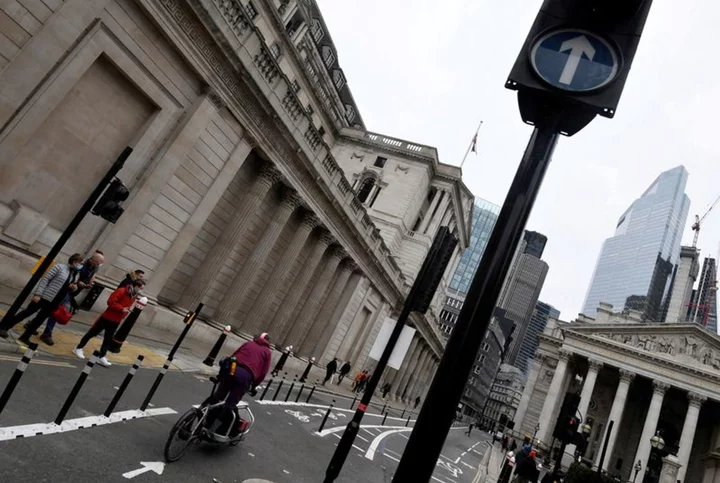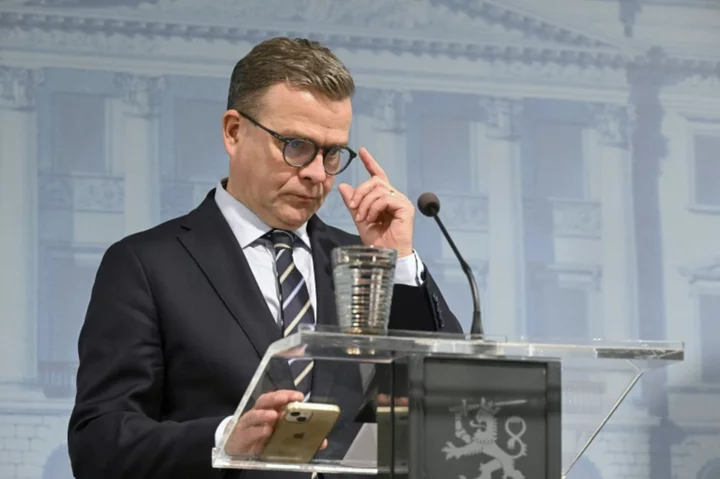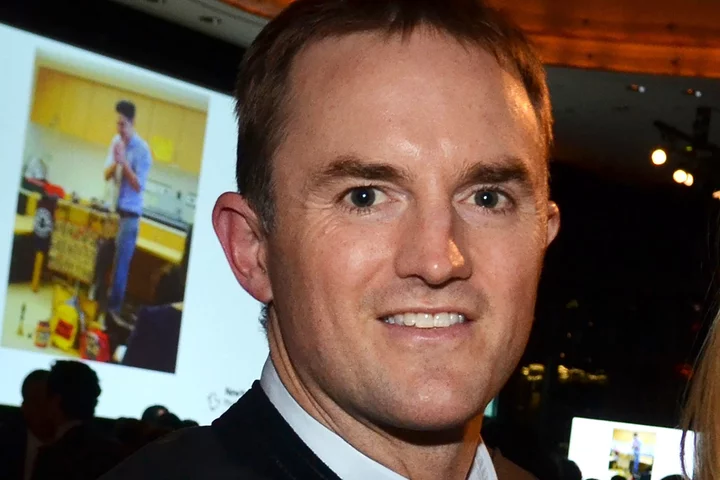By Yoruk Bahceli
As markets navigate a likely end to the steepest interest rate rises in decades, investors say the Bank of England has been less consistent in its messaging than other major central banks, making positioning in UK assets a particular challenge.
Traders, who bet the BoE was nearly done in May, now price in over 100 basis points of further hikes. U.S. Federal Reserve and European Central Bank expectations have meanwhile risen only marginally.
For investors, clear communication from central bankers is crucial as they transmit their policy to borrowing costs through markets.
The BoE was the first major central bank to start hiking rates. But investors said a lack of clarity was now a reason behind still surging UK borrowing costs and volatility at 40-year highs.
Britain's 10-year bond yield has jumped almost 80 bps this year while the U.S. and German equivalents have fallen..
"The UK clearly has shown what happens if your communication as a central bank is a little bit ambivalent or ambiguous," said BNY Mellon Investment Management chief economist Shamik Dhar.
The gilts repricing "has partly come about because of the Bank of England's past reluctance to suggest that rates (might) get this high," Dhar, a former BoE economist, said.
Investors say the BoE, tackling the highest G7 inflation at 8.7%, has been too hasty signaling a peak in price pressures. Emphasizing external drivers has also weakened its message, they say.
The BoE has raised rates from 0.1% to 5% since December 2021. But last November it signalled rates were unlikely to rise as much as traders expected, then scrapped that language in December. Worried about recession risks, in February it signalled an approaching pause.
But as inflation and growth both surprised on the upside, it said in May it wouldn't signal future moves and would watch the data, then delivered a big 50 bps hike in June.
The BoE - which plans an externally-led review into its forecasting - declined to comment, pointing to May's policy meeting where Governor Andrew Bailey stressed shocks hitting the UK economy, including Ukraine's invasion first sending gas prices surging, and sharp drops since.
"There is a level of... hindsight in many of these judgements," Bailey told reporters when asked if the BoE should apologise for policy failures.
FOLLOWING, NOT LEADING
Big central banks have clearly been surprised by inflation, forcing them to adjust guidance. None suggested such prolonged hikes when they embarked on them and deemed inflation "transitory".
Markets have also challenged the ECB, which only got going in July 2022, and the Fed, initially criticized for underestimating the scale of tightening needed.
But those banks' messaging has repeatedly pushed traders to adjust bets to meet hawkish guidance. Traders no longer price Fed rate cuts this year.
In contrast, they have long bet on more hikes than the BoE's main forecasts have implied are needed to tame inflation, rates futures show.
"The Bank of England's had to follow the market with higher rates, rather than dictate to the market what it thinks it needs to do," said Schroders senior European economist Azad Zangana.
Schroders has increased its underweight gilts position, expecting UK rates to rise to 6.5%.
As late as May, while acknowledging risks, BoE forecasts showed that if rates peaked at 4.8% as markets expected then, inflation would fall to 1% in 2025.
That was "a signal to the market that either they had (priced) too many rate hikes or not enough rate cuts," Zangana said.
Strong data in June prompted the big hike and pushed traders to bet on rates rising as high as 6.5%. Data last week showing record-high wage pressures led to calls for a big August move.
"POOR SIGNALS"
No doubt, heavy dependence on gas for power generation and tougher labour market challenges, partly due to Brexit, have made forecasting British inflation harder. The surge in gilt yields last September as investors took fright at the scale of unfunded tax cuts planned by former Prime Minister Liz Truss has been another challenge.
"The BoE have been challenged by the fact that the inflation data has really accelerated and that was a surprise to everyone," said JPMorgan Asset Management head of global aggregate strategies Myles Bradshaw.
But external forecasters it surveys have nonetheless repeatedly expected higher medium-term inflation than the BoE's main forecasts.
"We knew all the facts ahead of time yet they still gave us poor signals, poor forecasts and indications that they will be more dovish than they turned out to be," Schroders' Zangana said.
Investors said it was unclear what data the BoE was reacting to.
Chris Jeffery, head of rates and inflation strategy at LGIM, said the ECB has been "repeatedly explicit" in focusing on bringing down inflation and the Fed "very transparent" on its focus on a core inflation measure.
"The Bank of England has not had the same kind of consistency," he added.
Fed and ECB policymakers have been reluctant to cheer good inflation news and signalled they would tolerate recessions to bring it down.
"If you look at the messaging that both (Fed chair Jerome) Powell and (ECB President Christine) Lagarde have given every single meeting, it's always been inflation is too high..., we're going to tackle it," said Royal London Asset Management head of rates and cash Craig Inches.
BoE messaging, suggesting a reluctance to hike, has made it "very difficult" to own gilts recently, he said.
(Reporting by Yoruk Bahceli; editing by Dhara Ranasinghe, William Schomberg and John Stonestreet)









